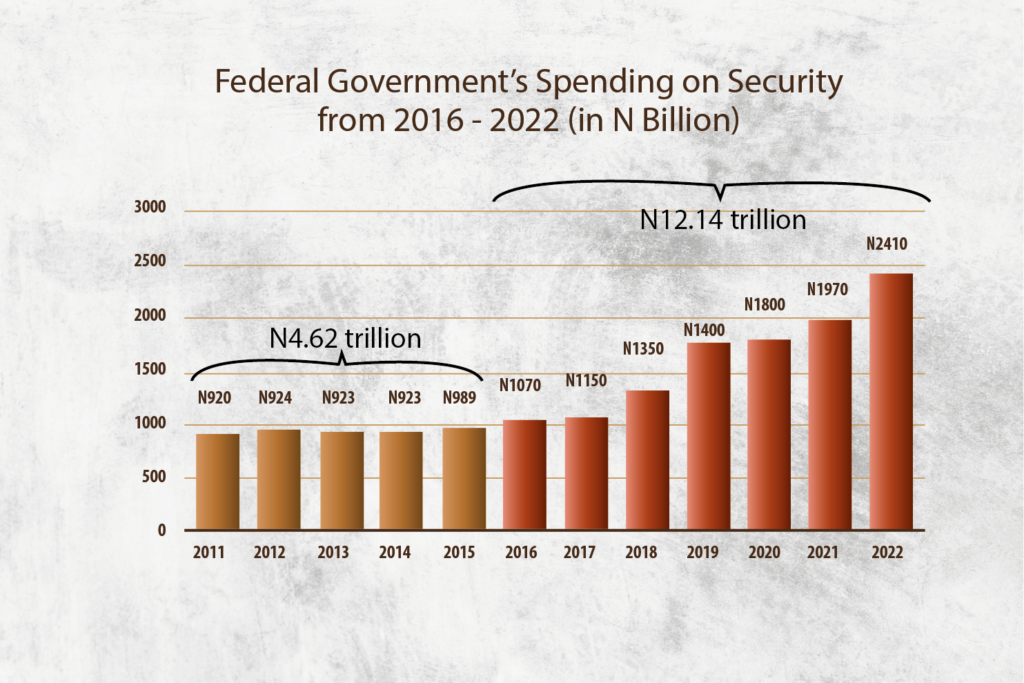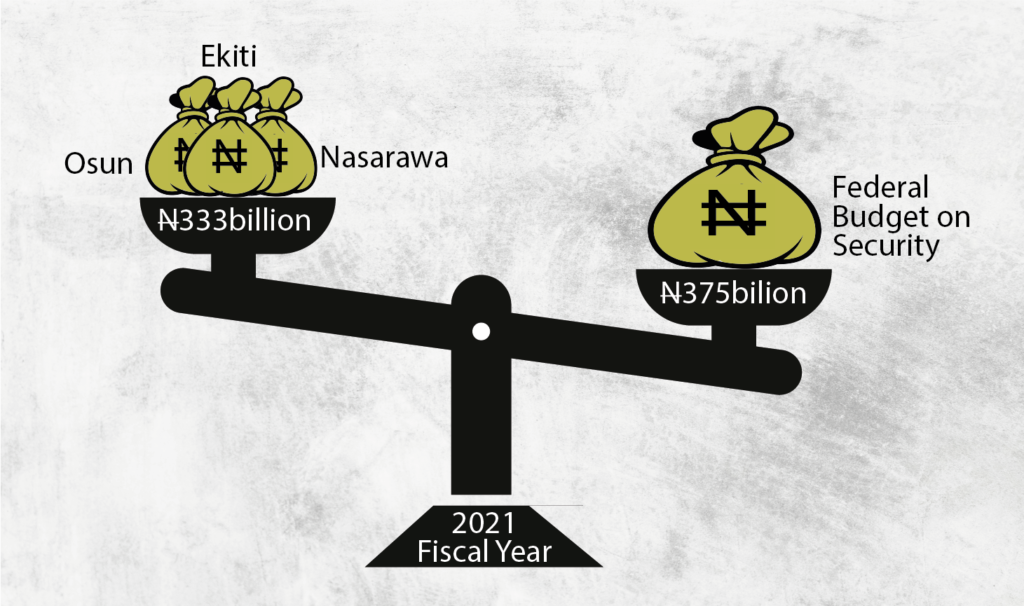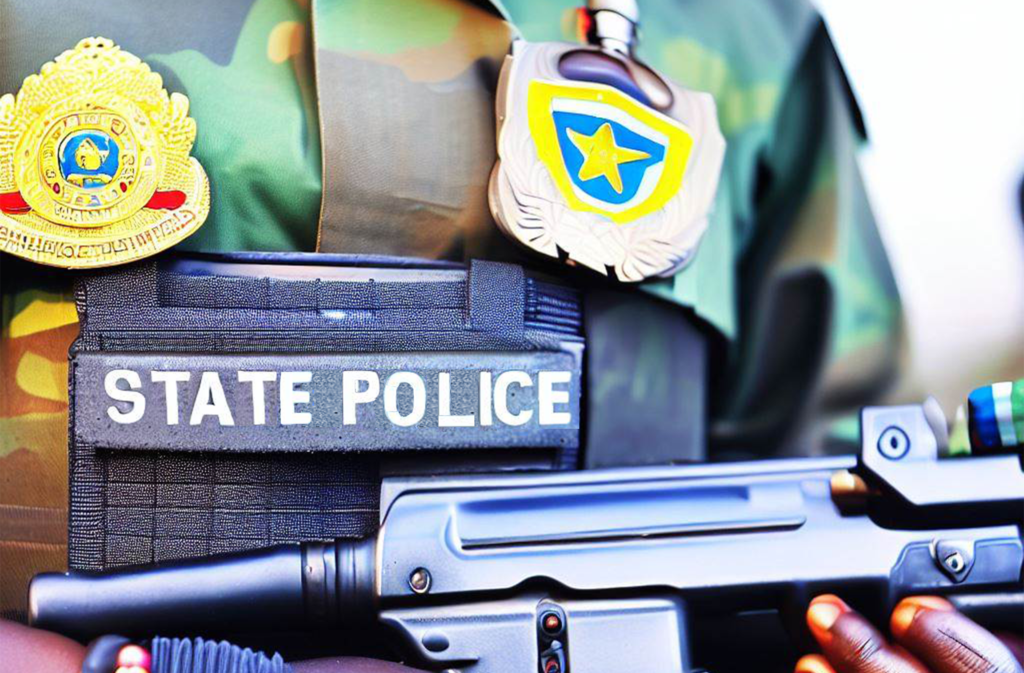
Insecurity in Nigeria
Nigeria has been plagued by insecurity for decades, with the situation only getting worse in recent years. About a decade ago, the prime perpetrators of the acts of terrorism were the Boko Haram Islamic Jihadists in the Northeast Region of the country. Today the monstrosity has metamorphosed and mutated into ISWAP, bandits, armed herdsmen and IPOB factions terrorizing innocent civilians and causing mayhem all over the country.
Insecurity has become one of the biggest problems faced by Nigeria today and one of the highest inhibitors of development. 10,366 lives were lost to activities related to insurgency and banditry in 2021 according to SBM Intelligence; an increase of 47% from the number recorded the previous year. This is besides thousands of lives lost to other forms of criminality country-wide. Nigeria was ranked third, behind Iraq and Afghanistan, in the Global Terrorism Index (GTI) 2020, using the number of incidents, fatalities, injuries and hostages as a yardstick[1]. Though Nigeria fared better in the 2022 rankings, it still falls within GTI’s 10 most terrorized countries, coming in at the 8th position[2].
Expectedly, Expenditure has heightened over the years for prosecuting the war against insecurity, but the results have been falling in terms of successes recorded, while casualty figures rise. Year after year the insecurity sector continues to gulp the highest chunk of the country’s budget expenditure. The budget for security rose from N920 billion in 2011 to N989 billion in 2015 and a total of N4.62 trillion in five years. The following seven years saw the budget increase to a total of N12 trillion, the actual expenditure having been shrouded in opacity. These are the budgets of the federal government, in whose purview lies the constitutional control over the security apparatus of the country. Despite the huge amount of money allocated to security, the country still suffers from terrorism, kidnapping, armed robbery, and other forms of criminal activities.
Security Vote: Illegality and Corruption
The prevailing milieu is the excuse behind the collection of huge sums of money by the federal government, some state governors and local government chairmen, monthly, in name of security vote. So, though security vote is not captured anywhere in our constitution, billions of public funds are being appropriated by the Chief Executives of the three tiers of government in the guise of fighting insecurity. In 2021, the state governors and local government chairmen in the country reportedly spent a total sum of N375 billion naira under the cloak of security vote. This is more than the combined annual appropriation for Osun, Nasarawa and Ekiti states for the same fiscal year. Since one cannot tell the composition of items that form the expenditure, it is difficult to evaluate the performance of the ‘vote’. But one sure and basic way to look at it is to appraise the current situation of security (or insecurity) in the country vis-à-vis the expenditure.
While it is unclear who started the practice of security vote, it could be traced to the military regime of General Yakubu Gowon who granted state military administrators small “out of budget” funds for pacifying some influential civilian elites[3]. It has now become a convention among the governors and the local government chairmen, who make discretional expenditures without accounting for the huge sums from public funds. The funds, which are frequently collected in cash by governors, are distributed at their whims because they are not subject to legislative supervision or independent audit. Sadly, despite the vast quantities of money, they appropriate to themselves from the public coffers, state governors have not been able to improve on or make any meaningful impact on the security situation in their states. Instead, abductions, mysterious security breaches, religious intolerance and violence, ethnic conflicts and communal clashes and other criminal activity in their states continue to increase.
In some cases, the security votes (often separate from the budget on security services) have been used to finance personal and political activities of, and on behalf of, corrupt politicians. The former Acting Chairman of the Economic and Financial Crimes Commission (EFCC) Mr Ibrahim Magu had alleged that some state governors deliberately fuel insecurity in their states to collect more money vide the slush funds, drawing a connection between corruption, banditry and terrorism. This has further led to the growth of organized crime in the country, with criminals operating with impunity and little fear of being caught or punished. This is evident in instances where known criminal elements were found in the company of and on the properties of state governors who provide protection for them. Some of these elements are instruments in the hands of politicians for perpetrating thuggery and electoral fraud. It is, therefore, little wonder that the governors would prefer to keep the procurements from the security vote in perpetual opacity.
The Excuses for Security Vote
There’s the feeling in some quarters that the use of security funds requires some measure of discretion from the managers to the extent that the matter of security requires considerable confidentiality. The argument is that of the positive element of secrecy and surprise that security operations need to make incursions to the den of the criminals causing problems in society. It, therefore, requires the funds to be disbursed from the first line of charge of the state and not subject to budget and legislative approval. Again, many state governors have justified the collection and expenditure of the security vote on the support they have been extending to the federal security agencies like the Police, Army, Navy, DSS, Nigeria Security and Civil Defence Corps (NSCDC) etc, deployed in their states with logistic and operational facilities. The Chairman of Nigeria Governor’s Forum and Ekiti State Governor, Dr Kayode Fayemi declared that the state governors provide more funding to the Police than the Federal Government does. He asserted that “We buy them vehicles; we pay them allowances. In some cases, we even buy ammunition; of course, under the authority.[4]”
Even if this line of argument of disclosure is excused, discretion does not preclude accountability. If the funds are excused from the budget, they could still form part of the Accountant General report giving light on how the funds were expended. And also, while it may be admirable for state governors to support security organs deployed to their respective states, security votes lack transparency, making it impossible for state authorities to separate their discretionary security expenditures from the federal government to determine whether the costs they are covering have already been covered by federal funds. The government at all levels, therefore, owe it as a matter of duty to give an account of the expenditure of these huge sums which make up a substantial percentage of the budget and concerned citizens have been calling for the governors to tow the path of honour and do so. After all, they are public funds. The most disheartening is that the governors are all too quick to give excuses for lingering insecurity in their state to the fact that the security outfits are controlled by the federal government and that they are only the chief security officers in the state by mere nomenclature and not in practice. If that is the case, then the governors have no business collecting funds which they know would not impact the purpose for which they are being appropriated.
Measures Taken to Curbing the Corruption
Rising from the recent outcry for the accountability of security votes from civil society, the federal government barred state and local governments from operating security votes with commercial banks. It also directed governors to open a special account with the Central Bank of Nigeria if they desire to obtain cash for expenditure from the security vote. This is part of the measures to implement the directive of the Nigeria Financial Intelligence Unit (NFIU) prohibiting cash withdrawals from public accounts with effect from March 1, 2023 with an extended window for cash withdrawals for security vote until May 29 2023. It is, however, left to be seen if this directive would yield the desired results, considering that similar instructions given by the federal government have failed to live up to its purpose. One such case is the guidelines on the withdrawal of funds from the State Joint Local Government Account which has failed to instate financial autonomy in the local government as the state governors are still in control of the funds that accrue to the local government from the FAAC account. To date, we have not heard of anyone being sanctioned for flouting the directive which is backed by section 162 (6) (8) of the 1999 Nigerian Constitution and affirmed by Justice Inyang Ekwo of the Federal High Court.
Many watchers have viewed this latest move by the Mohammadu Buhari administration as cosmetic. Questions are being asked why the federal government allowed the state governor to muscle them to put forward the implementation of the ‘no cash’ withdrawal deadline to May 29th, at which time, the government would have handed over to a new administration, leaving implementation to the decision of the new administration. This concern is also amplified by the actions of the Commander in Chief of the Armed Forces of Nigeria, who granted presidential pardon to persons like, Joshua Dariye and Jolly Nyame, the former governors of Plateau and Taraba states respectively, who were jailed for appropriating billions of naira from public funds without accounting for them.
Some states have made policies aimed at making the expenditures from the security vote more open for public scrutiny to improve transparency. For instance, the Lagos State government has introduced the Lagos State Public Financial Management Law, which requires all government agencies, including the governor’s office, to submit regular reports on their financial activities. The law also mandates that all government contracts, including those related to security, must be awarded through a competitive and transparent bidding process.
Similarly, the Ekiti State government has established a Security Trust Fund to manage the state’s security vote. The trust fund is managed by a board of trustees, which includes representatives of civil society organizations and security agencies. The board is responsible for the allocation and expenditure of the security vote, and it is required to submit regular reports to the public on its activities.
A Better Way Forward
1. Total reformation of the security vote system,.
While the measures taken by the state governments mentioned above are commendable, more needs to be done to ensure transparency and accountability in the allocation and expenditure of security votes in Nigeria. The federal government should take the lead in reforming the security vote system, by adopting a national policy on the allocation and expenditure of security votes. The policy should stipulate clear guidelines on how the funds should be allocated, managed, and accounted for, as well as the consequences for any abuse or mismanagement of the funds.
2. Pass a Federal Law outlawing security votes at all levels.
Notwithstanding the fact that security votes lack any statutory or constitutional support, it is doubtful that federal, state, and municipal governments would quit using them unless they are forced to. Legislation that specifies budgetary guidelines and standards for security spending should go hand in hand with a restriction on the use of security votes.
3. Obtain legal backing for the enforcement of accountability of security votes
As an alternative to points 1 and 2 raised above, Civil Society should approach the competent court of jurisdiction to compel the state governor to account for the humongous amounts of money they collect in their respective domains in the guise of a security vote. A similar case filed in the Federal High Court, Lagos in 2020 by Legal Defense and Assistance Project, Legal Resources Consortium was struck out for want of jurisdiction. The court pronouncement should also include guidelines to enable monitoring by specially approved lawmakers and government auditors for truly secret procurements. If keeping some of the federal and state security budgets secret is so crucial to maintaining national security, then it should be as crucial that the money is used wisely. Effective supervision procedures must be put in place if this is to be ensured.
4. Constitutionalize State Police
Currently, the police force in Nigeria is centralized and controlled by the federal government. This means that the federal government is responsible for the recruitment, training, and deployment of police officers across the country. However, the security challenges in Nigeria vary from state to state, and there is a growing concern that the federal police have not been able to effectively address these challenges. Therefore, proponents of state police argue that allowing each state to have its own police force would enable a more localized approach to security, with officers who are more familiar with the local terrain and culture. And again, if this is done, it will not be difficult to vindicate or censure the collectors of funds meant for the purpose of security by the performance of their respective state policies in their ability to curb insecurity and maintain law and order. While the wider apprehension that it could lead to abuse of power by state governors cannot be dismissed casually, the federal government have also been accused of manipulating the instruments of coercive force for political and personal purposes and obstructing free speeches. And so, that does not imply that the concept of state police as a whole should be abandoned.
5. Strengthen the Security Structure and Enhance Synergy Among them and with Citizens
To address the worsening security situation in Nigeria, there is a need for a multi-pronged approach that involves both short-term and long-term solutions. The Nigerian security system is characterized by a lack of coordination and synergy among the various security agencies. This has led to a situation where the different security agencies operate in silos, with little collaboration or information sharing. Even where there are, the different forces still lack proper synergy. Better collaboration and information sharing among the various security agencies by putting in place mechanisms that facilitate communication and coordination among the agencies is necessary. Nigerian security agencies need to invest in technology that can help them to better monitor and track criminal activities. This could include the use of drones, CCTV cameras, and other surveillance equipment. In addition, there is a general lack of trust between the citizens and the security agencies, which has further compounded the security challenges in the country. Many Nigerians see the security agencies as being corrupt, ineffective and unfriendly, leading to a situation where citizens take matters into their own hands, often resulting in violent clashes and further worsening the security situation.
[1] https://tradingeconomics.com/country-list/terrorism-index
[2] https://www.visionofhumanity.org/global-terrorism-index-2020-the-ten-countries-most-impacted-by-terrorism/
[3] CAMOUFLAGED CASH How ‘Security Votes’ Fuel Corruption in Nigeria, Matthew T. Page, May 2018, Transparency International
[4] Fayemi justifies security vote, says governors spend more on police than FG – Daily Trust




